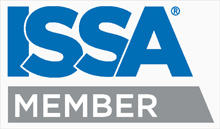Concrete Floor Care: Myths & Truths
The use of concrete in all types of facilities, from industrial buildings to retail facilities, is becoming more and more prevalent. The reason for this shift is the belief that concrete flooring is low maintenance. However, there is an important distinction to be made here between “low maintenance” and “no maintenance” and how this impacts concrete floor care.
No floor surface is “no maintenance.” Care must be taken with every floor surface, even concrete floors, to properly clean and maintain the floor to prolong its life and keep its appearance looking nice. Below are some myths about concrete floor care that cause many floors to be improperly maintained, leading to bad flooring appearance and reduced life of the floor.
Myth #1: Chemicals are not needed to maintain concrete floors.
Again, concrete floors are by no means “no maintenance.” A concrete floor is subjected to the same dirts and soils as any other flooring, and cleaning chemicals are used to emulsify and remove these soils. Concrete is not an exception to regular maintenance; a concrete floor care program needs to include proper cleaning in a similar manner to any other floor.
However, care does need to be taken in the choice of the correct chemical to use. While some floors, particularly in restrooms, can be cleaned with acidic cleaners, this could severely damage concrete floors by etching them. When cleaning a concrete floor, always use a neutral cleaner or a cleaner with an alkaline pH. For daily cleaning a neutral cleaner should be used, and for deep cleaning and high traffic areas, a degreaser or all-purpose cleaner can be used.
Myth #2: All concrete surfaces can be treated the same.
Concrete flooring falls into one of two categories: coated or polished. In order to take a bare (dull) concrete floor and make it suitable for use and to give it a nice shiny appearance, you can either put a coating on the floor or polish it. Epoxies and urethanes are common coatings applied to concrete, or the surface is polished with a series of abrasive pads infused with microscopic diamonds to make a smooth surface.
Depending on how the floor has been prepared, your concrete floor care program will include different maintenance routines. Epoxy and urethane coatings each have their own maintenance needs and programs to consider. Some coatings should only be cleaned with certain chemicals, and some coatings should not be cleaned with abrasive pads. Polished concrete is maintained with highly abrasive pads to keep the appearance up. It is very important to consider the coating or polish on your concrete floor before developing a maintenance program.
Myth #3: All cleaning staff know how to properly clean concrete floors.
With all the budget cuts in the maintenance and janitorial departments, chances are someone with little to no experience is cleaning the concrete floors in most facilities. It is important that all personnel that are responsible for maintenance of any floor surface, including concrete, are properly trained on concrete floor care and procedures for that particular floor. As seen above, every floor should be treated differently depending on how it has been prepared.
Myth #4: Concrete floors will have a long life without any cleaning or maintenance.
Concrete is low maintenance, not no maintenance. If the floor is not properly maintained, its life will shorten and it will start to get dull and scratched. If the floor is coated with an epoxy, urethane, or any other coating, the life of the floor depends on how well the coating is maintained, as well as the quality of the coating itself. If the floor has been polished, the life of the floor depends on the quality of the initial polish of the floor, as well as how the polish/gloss is maintained by abrasive pads over the life of the floor. Properly maintained concrete floors will last longer than many other flooring materials, but they still require proper maintenance.
Myth #5: Soil types and soil loads do not affect concrete floor care and how concrete floors are cleaned.
In terms of soil types and loads, concrete floors are no different than any other type of flooring. Soil type and soil load determines the frequency, intensity, and method of cleaning. Heavy traffic areas will require more frequent and intense cleaning, and different soil types dictate the use of different chemicals or methods for proper cleaning. You still need to customize your maintenance program for concrete floors according to the conditions in your facility.
Concrete floors are becoming more and more popular due to their low maintenance nature. However, it is very important to know that proper concrete floor care is needed in order to maintain the gloss and appearance and prolong the life between restorative care procedures.
For more information on floor care for any type of flooring, visit Multi-Clean’s Floor Care webpage. For more information on concrete floor care and coatings for concrete, check out Multi-Clean’s Concrete Floor Care method bulletin.


